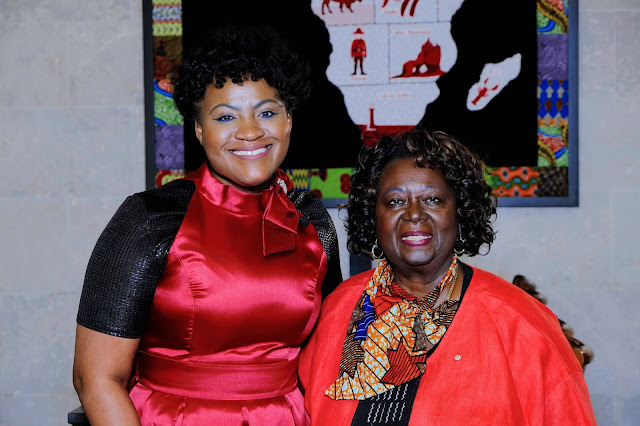By Neil Armstrong
 |
| Photo credit: Eddie Grant Jamaica's High Commissioner to Canada, Janice Miller, is flanked by her husband, Donald Miller, left, and Lloyd Wilks, Jamaica's Consul at Toronto, right. |
Jamaicans in Toronto, Canada, chose a provincial holiday –
Family Day, on February 17 -- to bid the top Jamaican diplomats adieu now that
their tour of duty has ended.
Having assumed duties in October 2014, Janice Miller, high
commissioner for Jamaica to Canada, and Lloyd Wilks, consul general of Jamaica
at Toronto, who began on January 5, 2015, have completed their tenure and will
return to their homeland.
“It has been a rewarding tour and one which I will look back
on with warm affection as Canada and Jamaicans in Canada will always occupy a
special place in my diplomatic memories,” said Miller describing her leaving as
“bittersweet.”
While she is looking forward to warm weather and beautiful
beaches, she said it will be sad to say goodbye to Canada where through her
many professional and personal interactions she has been able to forge many
friendships and relationships to assist in deepening the already strong bilateral
cooperation between Jamaica and Canada.
“The relationship between Jamaica and Canada has
strengthened since 2015 through regular bilateral consultations between our two
countries, resulting in mutually acceptable outcomes and cooperation programs,
including on defence, security, climate resilience, labour flows and
multilateral cooperation.
Miller said there have been various meetings and
interactions between the prime ministers of Jamaica and of Canada, and at the
ministerial level.
She noted that in 2018 Prime Minister Andrew Holness visited
Canada as a special guest of Prime Minister Trudeau at the G7 summit held in
Quebec.
She said the centuries-old relationship between Jamaica and
Canada has evolved from the exchange of saltfish and rum to one of mutual
respect based on deep friendship and shared values, “most importantly, the
strong people-to-people contacts between Jamaica and Canada have greatly
enriched the relationship.”
“Indeed, it has been gratifying to witness, firsthand, the
increasing interest of Canada in the Jamaican diaspora in Canada. More than
anything, among the highlights of my tour of duty, has been to witness the
organization and representation of the Jamaican community.”
Miller said the work undertaken by Jamaicans in Toronto
continues to be impressive and she praised them for being phenomenal in
promoting Jamaica, addressing concerns of the Jamaican and Caribbean
population, supporting the vulnerable in society and in leading by example “so
as to inspire and involve new generations – our young people.”
She said their support in building Jamaica through their
generosity, philanthropy, and investment continues to be highly valued by the
government of Jamaica.
Wilks, who first served in Toronto with the late consul
general, Kay Baxter, in 1990 said her contribution is still very visible in the
Greater Toronto Area.
He remembered some people who are no longer alive that he
said did a great job, such as Raphaelita Walker, Charles Roach and Dudley Laws.
He said these people laid the foundation and so when he
assumed duty in 2015 he returned and found a well-organized Jamaican community.
“We have given – between Miss Lou and the rest of us who
aspire to greatness – we have given this country a real meaning of diversity.”
Wilks said when he came back to Toronto he could recognize
how far the city had come as it had become a place known for its diversity and
arguably the best place to live.
He thanked the various organizations – alumni associations,
Helping Hands Jamaica Foundation, JAMBANA, Rastafest, Jamaica Day, P.A.C.E.
(Canada), Carpenters Union, and more -- for their contributions to Jamaica and
for celebrating Jamaican culture in Toronto.
JCA president, Adaoma Patterson, commended the diplomats for
the work they have done and the support and commitment they gave to the
community in Toronto and Canada.
Meanwhile, Diana Burke, president of P.A.C.E. (Canada), said
the tireless efforts of the high commissioner to meet the Jamaican
organizations across Canada took her to many cities, such as Montreal,
Winnipeg, Vancouver and Halifax.
Rhona Dunwell,
president of the Alliance of Jamaican Alumni Associations, said Wilks has
contributed to the promotion of positive relations throughout the Greater
Toronto Area during his tenure.
She said he helped to stimulate greater networking among the
various groups and almost every organization now requests the help of the
consulate in dispatching information about their upcoming events. Dunwell said
that under Wilks’ leadership that database has grown from 500 to over 5,000.
There were also presentations by the Canadian Jamaican
Diaspora Christian Alliance, New Direction dancers of Revivaltime Tabernacle,
Leviticus Band, and Django.
The opening prayer was by Bishop Ransford Jones of Destiny
Gospel Centre Markham and Yvette Blackburn of the Global Jamaica Diaspora
Council concluded the event with some remarks.
[This story has been published in the North American Weekly Gleaner, February 27-March 4, 2020.]













